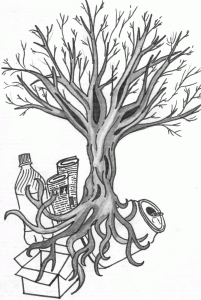
Morgan Kennedy, Staff Illustrator
There was a point in time when the “green” movement was just an obnoxious hippie crusade against materialism, greed and modernity — and perhaps in many ways, it still is. Either way, judging from the number of environmental advocacy groups on campus, there is no doubt the movement toward sustainability continues to be in fashion and in demand.
Between Engineers for a Sustainable World, Green Team, EcoReps, the Student Association of Vegetarian and Vegan Youth and more, the range of student environmental advocacy organizations on campus is wide. We have a vibrant community of environmental leaders and a passionate group of students committed to giving Mother Nature a helping hand. This is a point that we as school are proud of, and rightly so.
Yet having surveyed the “green” landscape at UR and having been an active EcoRep in the past, there has been no campus organization, when compared to Grassroots, that is more fervent in discussing, spreading and understanding every angle of the debate on sustainability.
Meetings in most environmental groups are often filled with one-sided arguments, where debate stops and ideas stand still. One side of the room advocates for eating locally and purchasing “sustainably” grown produce. On the other side of the room, organic is all the rage and is the Holy Grail to a healthy, wealthy and happy world. And that’s where discussion stops — no mention of cost-benefit, no mention of efficiency, no mention of incentives.
Maybe it’s the “hipster” mindset that is the basis for the reluctance of many greenies in admitting that the basic, albeit questionable, tenets of sustainability have already been embraced by the mainstream: Recycling, eating locally and driving electric cars are good for the environment.
So what sense does it make to continue repeating the same mantra? This is in no way a productive use of our time, and we ought to avoid this doctrine if we want to make any progress for the movement toward true sustainability.
Activism is certainly important in making progress, but insofar as we understand the pitfalls and implications of the environmental policies we advocate. Beyond just reading and reciting the scriptures of Bill McKibben, we ought to engage in serious discussions about the merits of the green ideas that we advocate by digging deeper into the unintended consequences that may arise. The lack of serious debate in many environmental groups on campus is worrying and is something we at Grassroots have been committed to avoiding — even if it means forcing ourselves to play devil’s advocate. After all, great environmentalists are those who are comfortable with arguing from both sides of the aisle.
Despite that, all too often we shun and silence dissenting voices by dividing ourselves between “believers” and “nonbelievers.” Take my old EcoRep manual, where a chapter on climate change included a discussion point entitled: “How to approach the non-believers,” as if we, the angels of Mother Earth, are out to fight a campaign against some sort of sinful creed. Such militant rhetoric and insistence on segregating ourselves from “nonbelievers” does nothing but generate revolt.
We claim to be open-minded, yet ostracize “nonbelievers.” We claim to be humanitarians, yet put our philosophy of environmental “do-gooding” ahead of people. And we claim to be “progressive,” yet we snub modern industrial society and economic progress.
Let’s be honest — beatnik flower children have long dominated the environmental movement. Yet at the same time, there are a whole host of other worldviews and opinions out there that are equally, if not more valuable in making true progress for our cause. Embracing this is what we have done in Grassroots. From socialists to free-market fanatics, from hippies to yuppies, we continue to welcome and represent you.
As the green movement continues its momentum, we hope to look beyond the current rhetoric and examine the intentions and implications of the ideas we advocate. Dividing ourselves amongst believers and nonbelievers is unproductive and something we should avoid. Building discussion goes beyond banning plastic water bottles or plastering “recycle” signs on campus — it relies on questioning, and maybe even doubting, the many policies we advocate.
Yuwono is a member of
the class of 2014.

